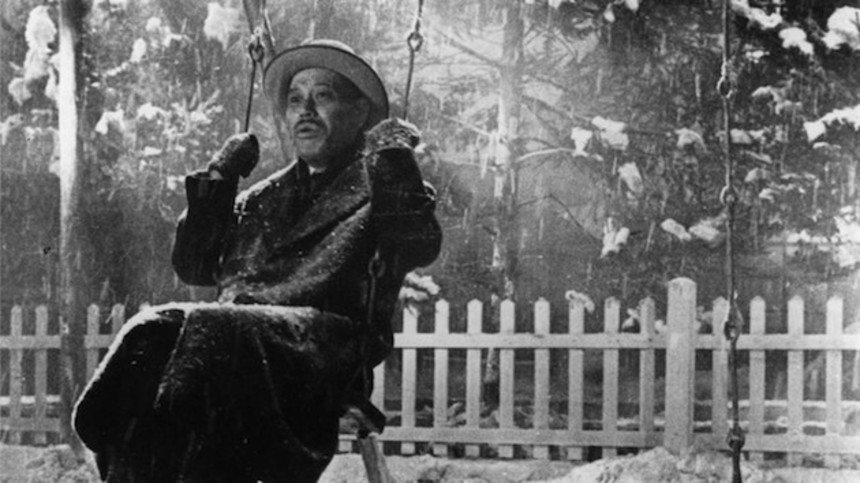Blu-ray Review: Akira Kurosawa's IKIRU To Live Again On Criterion

In the early '50s, Akira Kurosawa had the kind of career-high back-to-back film projects that few filmmakers could even approach, much less compete with. With Ikiru (1952) followed by Seven Samurai (1954), Kurosawa made his two best works. The latter continues to rule the roost as the exemplar of his overall canon, but if we are to divide Kurosawa's output in half - period films and non-period films - I'd argue that Ikiru is the director's zenith for projects set in the present day.
That's an enormous accomplishment, and if you consider that Ikiru, in turn, follows immediately upon the director's misguided adaptation of Dostoyevsky's The Idiot, Ikiru becomes even more impressive. (Ikiru, too, is very loosely based on a Dostoyevsky story - The Death of Ivan Illych.) Sixty-plus years later, Ikiru remains formally daring and ripe with heartbreaking pathos. It also - if we are to trust the world's great filmmakers to truly swing for the fences once in a while - about as complete a portrait of the meaning of life as one could hope for.
The plot is simply constructed. A petty bureaucrat, Watanabe (Takashi Shimura), learns that he has terminal stomach cancer. (In an unsettling acknowledgement of Japanese cultural mores of the time, Watanabe's doctor discloses none of this - Watanabe must piece together the truth of his diagnosis from waiting room hearsay.) Already a ghost of a man, stamping papers in a go-nowhere job and estranged from his son and daughter-in-law, Watanabe plunges into a spiral of self-doubt and mounting depression as he assesses the ultimate value of his soon-to-expire life.
Watanabe turns first to attempted debauchery (a drunken night out in Tokyo's mean streets with a layabout writer), then companionship (a series of platonic "dates" with a childish young lady from his office), but finds no solace in either.
In the film's extraordinary third act, we are posthumously shown what Watanabe did with the last six months of his life: he worked quietly within the system to turn a toxic sump into a city park. (Yes: Parks and Rec stole its whole first season plotline from Akira Kurosawa.) In these final moments of Ikiru, a calmly existentialist worldview is lovingly revealed: if nothing we do matters, then the only thing that matters is what we do.
In watching the film again on Criterion's blu-ray upgrade of their original spine #221, I found myself thinking of A Christmas Carol. Watanabe might be headed for death at the end of the movie but he is, for all intents and purposes, dead when we meet him; a creature who once found the joy and purpose in his life, but has slowly allowed that spirit to expire as the years wear on and the disappointments mount.
Watanabe, like Scrooge, is retrieved from his living death by three "ghosts" - the writer, the girl, and in the third act, the ghost of Watanabe himself, as we tour the final months of his life via anecdotes at his own funeral. Shimura's performance swings effortlessly between rich, heartfelt modes: bearing the full, wordless grief of his imminent demise in the film's first act; delineating the quiet, noble certainty with which he approaches his final task in the third act's artful flashbacks.
The film's central image - central enough to make the cover of the blu-ray - is one of those rare, beautiful movie moments that snapped into focus for me the depth of joy and wonder, and portraiture of the human experience, that a film can accomplish. It's unforgettable and, like the theses of Kurosawa's best works, aspirational even in its tragedy. The director was, at his best, an optimist.
Criterion's restoration (from an original interpositive, the best-quality surviving element for Ikiru) is as quietly faithful as Watanabe himself. Fine film grain is beautifully maintained, though the image retains some evidence of wear and tear - a detriment to some, but so par for the course of my entire experience of Kurosawa's films that I'd be more concerned if the occasional scratches weren't there. Audio is rich and true, making the film's handful of signature aural showcases (a soundless street scene that explodes into full noise as Watanabe's focus shifts from inward to outward; a pair of crucial songs that will stay with you long after the credits roll) hum with life.
The special features are ported entirely from the standard-res DVD that was released over a decade. There's the (now de rigueur) instalment of "Akira Kurosawa: It Is Wonderful To Create!," a multi-part series of half-hour documentaries on the director's films. These are always great, mostly because they focus on the people who worked around Kurosawa in making his films; his script supervisor, for example, is heavily featured here.
There's also Steven Prince's 2003 commentary on the film, and a feature-length documentary on Kurosawa's filmmaking approach called A Message From Akira Kurosawa: For Beautiful Movies, broken into ten chapters on the various crafts of movie production and how Kurosawa employed them in his work. Made at the end of the '90s (shortly after the director's death), the film is too reliant on behind-the-scenes clips from Rhapsody in August, a trivial instalment late Kurosawa's career, but likely one of the few projects that generated enough EPK-style material to carry an examination like this. (As with Kubrick before him, watching Kurosawa freak out at his lead actress for not wrapping her grandchildren in a sheet correctly is as disconcerting as it is fascinating.)
While the blu-ray provides no fresh insights into Ikiru, the 4K restoration is strong enough to recommend upgrading your DVD if you are a fan of the director's work, and makes the disc a must-buy for anyone who hasn't yet experienced the director's humanist masterpiece.







